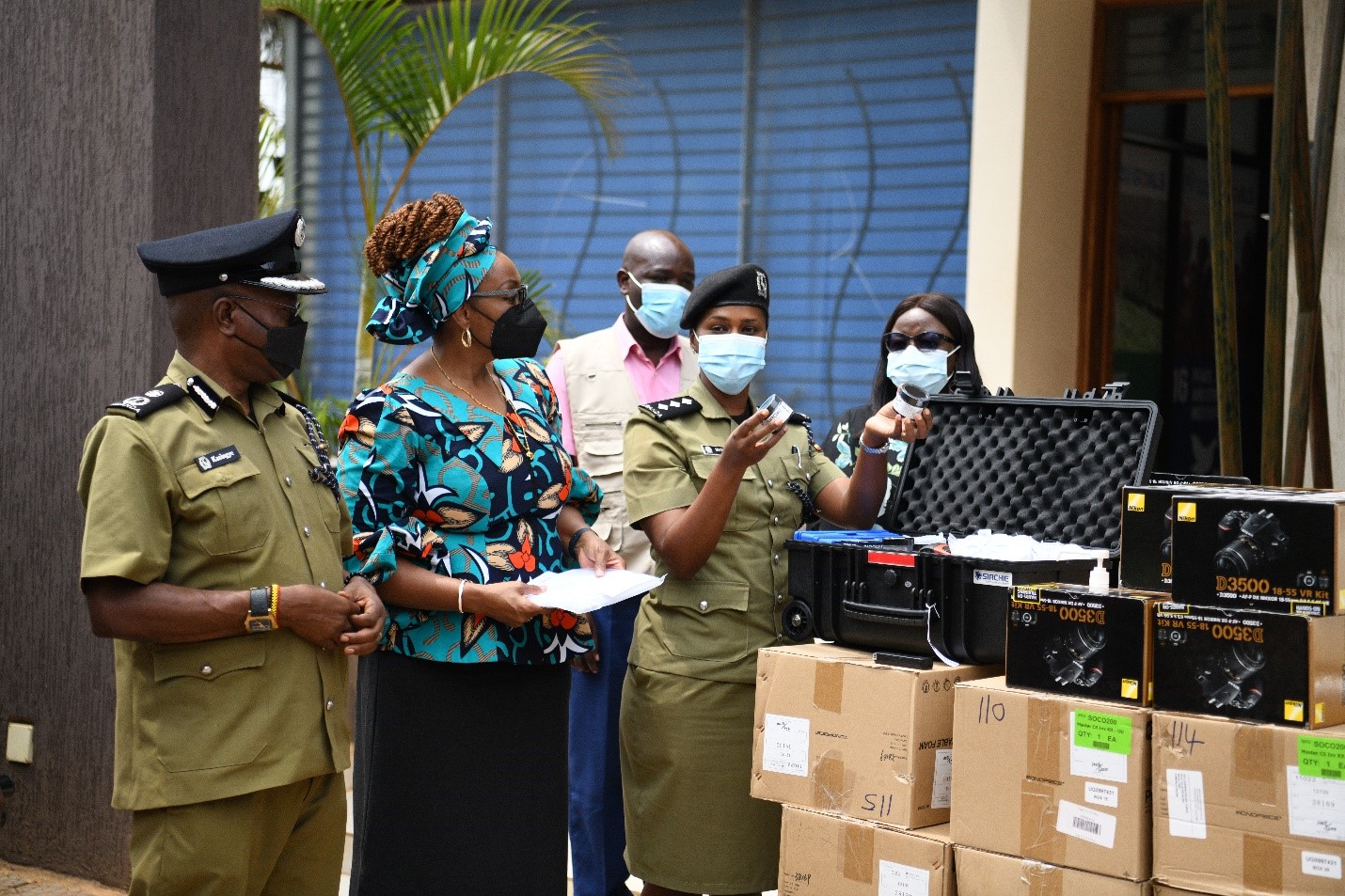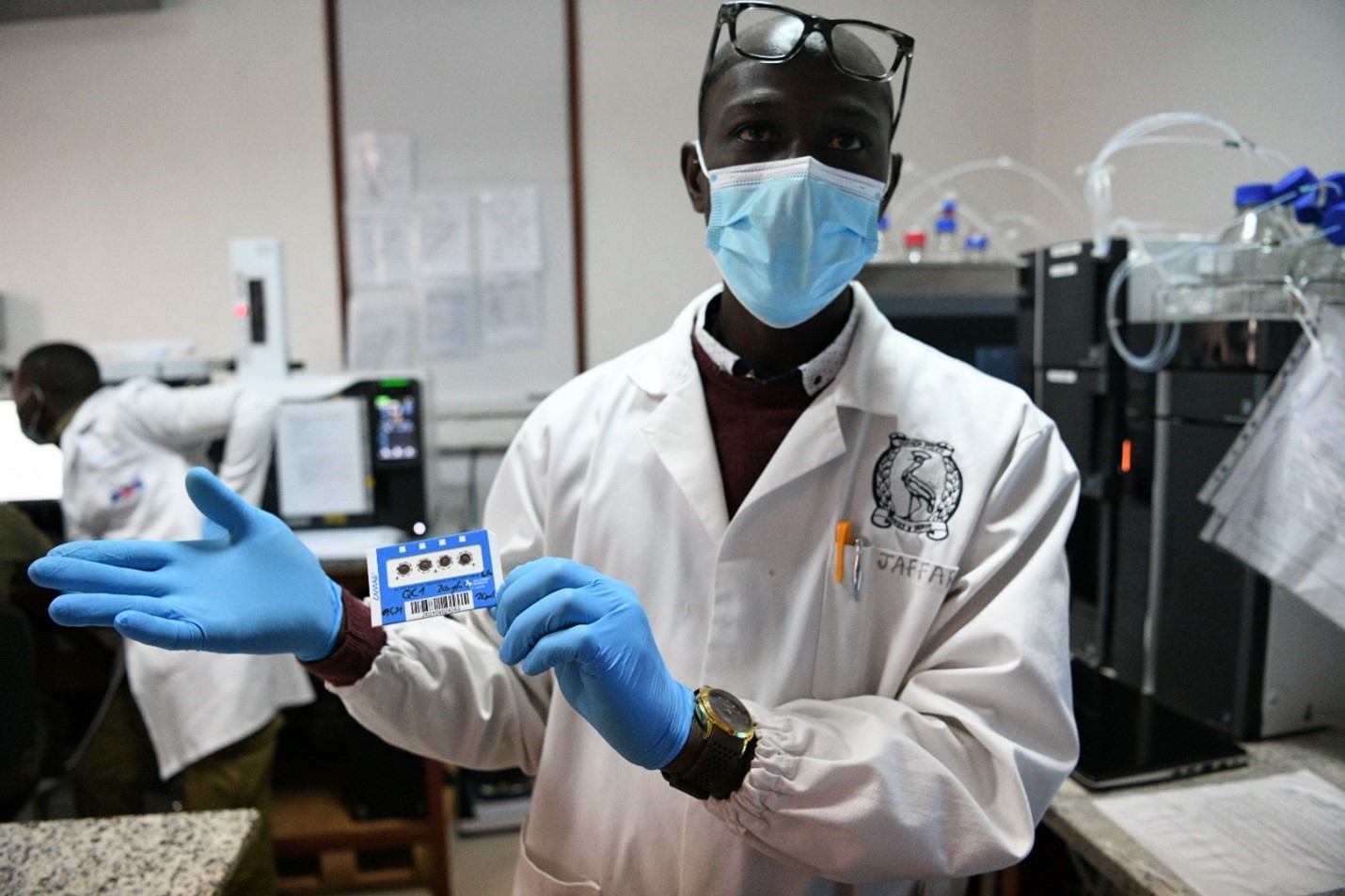Spotlight Initiative Supports the Uganda Police Force Forensics Department to Successfully Investigate SGBV Crimes
Date:
UN Women Uganda through the support of the EU-UN Global Spotlight Initiative and the Embassy of Sweden works with the Uganda Police Force to ensure trauma-informed and victim-centered investigation of Sexual and Gender-Based Violence (SGBV) crimes. UN Women has supported trainings on evidence collection and donated evidence collection vans as well as state-of-the-art technology to facilitate DNA collection for better investigations of SGBV crimes.
UN Women donated three Crime Scene Evidence Collection vans, 18 Scenes of Crime Officers (SOCO) kits, 18 scenes of crime cameras, DNA consumables (for the equipment), 3 pre-configured containers and 3 audio visual recording devices. The crime scene vans are used to maintain the quality of evidence, avoiding degradation of DNA samples.

"Women are reporting more and have developed trust and confidence in police. Forensic evidence speaks for itself, there is no longer this impression that there is need for a witness to the crime on sight." said Emmanuel Ogwang, Regional Scene of Crime Officer for Kampala Metropolitan East Area.
In addition to the equipment, UN Women supported the trainings of SOCO's in trauma-informed, victim-centered and gender-sensitive investigations. Assistant Inspector of Police Emmanuel Ogwang, Regional Scene of Crime Officer, Kampala Metropolitan was trained on evidence collection in 2020, to better facilitate investigation and therefore prosecutions of SGBV crimes. Ogwang spoke on the impact of the trainings: "I have learnt how to interview in a trauma informed and victim-centered way, I know how to work with investigating officers better and submit SGBV forensic evidence to relevant labs.
The Acting Director of Forensic Services ACP Andrew K. Mubiru shared reflections on this history of the Forensics Centre as a regional hub of excellence saying that 40% of the cases received here at the Forensics Biology Lab are related to Sexual and Gender-Based Violence cases.
Thanks to this equipment, the turnaround time on case investigation has been greatly reduced, as police now have an in-house DNA processing laboratory in addition to the Government Analytical Laboratory. On the game-changing acquisition of the equipment, Mubiru shared: "We are thankful to the Government of Uganda for upgrading our capabilities in 2020 when we procured DNA equipment. In the same year, UN Women paid a visit, during which they committed to support the efforts already in place by Government. DNA capabilities are crucial to support investigations and come in handy for SGBV crimes. We have been able to decrease backlog to 8 months. Further, the cases investigated have seen credible evidence of perpetrators in 70% of cases. That 30% gap would be filled by awareness (of the general public and medical practitioners) of these capabilities and training."
Reflecting on the impact of this support, Mubiru emphasized that DNA collection is important to prosecute crimes adding that "In two years' time is when we will see the court reports and the real success as cases become disposed."
Drug Facilitated Sexual Abuse Among University Students in Uganda
Director of Forensic Services Mubiru shared information around a 'new trend' in Kampala that is unspoken of. Criminals have accessed narcotics and psychotropic substances as well as off-the-shelf sedatives which are used as 'date rape drugs'. These criminals now have the capacity to subdue their unsuspecting victims who have been lured to a seemingly innocent outing or date. Survivors often do not report these incidences, due to stigma of association as often this is committed by intimate partners. Mubiru continued:
"We need to bring the perpetrators to book, the victims are often middle-aged university girls, and these men are violating them and their futures. We want victims and survivors to be able to report and know that we have modern chromatographic and mass spectrometry techniques capable of detecting trace amounts of endogenous and exogenous chemical substances in a variety of matrices such as blood, urine and hair."

Doctor Jaffar Kisitu, the Forensic Chemistry Section Head provides trainings for UPF Officers and Investigators on the use of the equipment to detect drugs. He divulged that the chromatographic machine detects trace amounts of substances and provides evidence to prosecute sexual violence crimes. He said "The samples determine alcohol content as well as drugs, the liquid chromotagraphy machine is a game-changer machine. The mass spectrometry machine is a detector, the gas chromatography machine is also a detector."
Increasing Optimism in the Uganda Police Force to Effectively Investigate Crimes
Uganda has seen an increase in optimism around reporting SGBV cases, as explained by Assistant Inspector of Police Emmanuel Ogwang, Regional Scene of Crime Officer for the Kampala Metropolitan East area. Ogwang trained as an Evidence Collection Trained Personnel focused on SGBV crimes. He noted "When cases occur in a community, and a victim gets justice they share that feedback with the rest of the community, and they are motivated to report similar cases."
Inspector Ogwang supported a 5-year-old victim to expound on the details of her abuse after her mother reported the case to police. A fellow schoolmate was another victim, originally silent to her abuse, after seeing the police successfully concluding the case, came forward to her mother who then reported that the same happened to her daughter.
Ogwang reflected "Thanks to the training, I confidently took the initiative to play a game with her [the victim] asking her to identify the location of the crime. She identified the bathroom, using evidence markers, the exact location of the crime. We did a crime scene reconstruction, collected evidence from those locations at the scene as well as clothes (of the perpetrator, her teacher) for testing."
Inspector Ogwang trained on the use of the sexual assault evidence collection kit, that was crucial in the investigation of two defilement cases in June 2022, and three in July 2022 that have been successfully issued. After a Scene of Crime Officer like Ogwang visits the scene, evidence is collected, investigated and a report is issued for the investigative officer who in turn hands a case file to Court. The evidence collected can last longer than 72 hours, as the lifetime of sperm cells on the body lasts up to 5 days. He told us "In Uganda, we have sunlight that affects the scene of the crime, but with the [UN Women supported] training now when we get to the scene, we pay attention to transient elements such as clothing, shoe impressions, palm prints, clothing fibres, hair, smear samples on the surfaces."
UN Women support led to an increase in SGBV cases reported and investigations effectively carried out by the UPF Forensics department. This support has seen an improvement in the quality of investigations of SGBV crimes, as the quality of the DNA is improved thanks to improved transportation facilities to the lab. This support has seen an increased prosecution of SGBV crimes across Uganda that ultimately leads to less impunity for crimes of this nature. While the immediate impact is already evident, it will truly be seen in two years' time when court reports and the success cases will become disposed of.